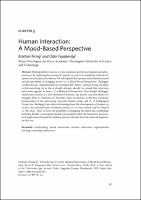Chapter 5 Human Interaction
A Mood-Based Perspective
| dc.contributor.author | Firing, Kristian | |
| dc.contributor.author | Fauskevåg , Odin | |
| dc.contributor.author | Firing, Kristian | |
| dc.contributor.author | Faustevåg, Odin | |
| dc.date.accessioned | 2018-10-08 11:37:20 | |
| dc.date.accessioned | 2020-04-01T12:20:29Z | |
| dc.date.available | 2020-04-01T12:20:29Z | |
| dc.date.issued | 2018 | |
| dc.identifier | 1001646 | |
| dc.identifier | OCN: 1076682562 | en_US |
| dc.identifier.uri | http://library.oapen.org/handle/20.500.12657/28316 | |
| dc.description.abstract | "During military exercises, crisis situations give the participants mood experiences. By exploring the concept of “mood”, our aim is to contribute to the development of new interaction theory. We will explore three perspectives related to mood and the possibility of changing mood: (1) A Mood-Based Perspective: Heidegger ascribes moods a fundamental role in human life. Before a human being can think or feel something, he or she is already attuned, already in a mood that structures how reality appears to them; (2) A Rhetorical Perspective: Even though Heidegger understands moods as a non-thematized horizon, our moods can nevertheless be changed. Here we elaborate on Aristotle’s ideas on rhetoric as the first systematic hermeneutics of the interacting, everyday human being; and (3) A Pedagogical Perspective: Pedagogy here refers to learning about the development of humans in society. An existential part of human existence is to sense moods and be attuned to “the other”. Then we have the possibility of changing the mood and establishing harmony. Finally, a conceptual model is presented to show the theoretical and practical implications beyond the military exercise that has been the point of departure for this text." | |
| dc.language | English | |
| dc.subject.classification | thema EDItEUR::J Society and Social Sciences | en_US |
| dc.subject.classification | thema EDItEUR::J Society and Social Sciences::JW Warfare and defence | en_US |
| dc.subject.classification | thema EDItEUR::J Society and Social Sciences::JW Warfare and defence::JWK Military and defence strategy | en_US |
| dc.subject.other | Samhandling | |
| dc.subject.other | mood | |
| dc.subject.other | interaction | |
| dc.subject.other | rhetoric | |
| dc.subject.other | education | |
| dc.subject.other | organizational | |
| dc.subject.other | learning | |
| dc.subject.other | leadership | |
| dc.subject.other | unforeseen | |
| dc.title | Chapter 5 Human Interaction | |
| dc.title.alternative | A Mood-Based Perspective | |
| dc.type | chapter | |
| oapen.identifier.doi | 10.23865/noasp.36.ch5 | |
| oapen.relation.isPublishedBy | bf7b42a4-6892-42e3-aaf8-8f32c8470a8b | |
| oapen.relation.isPartOfBook | 2724fb8b-60f0-4a89-9f93-98ba00ad6223 | |
| oapen.pages | 16 | |
| oapen.place.publication | Oslo | |
| oapen.identifier.ocn | 1076682562 |

